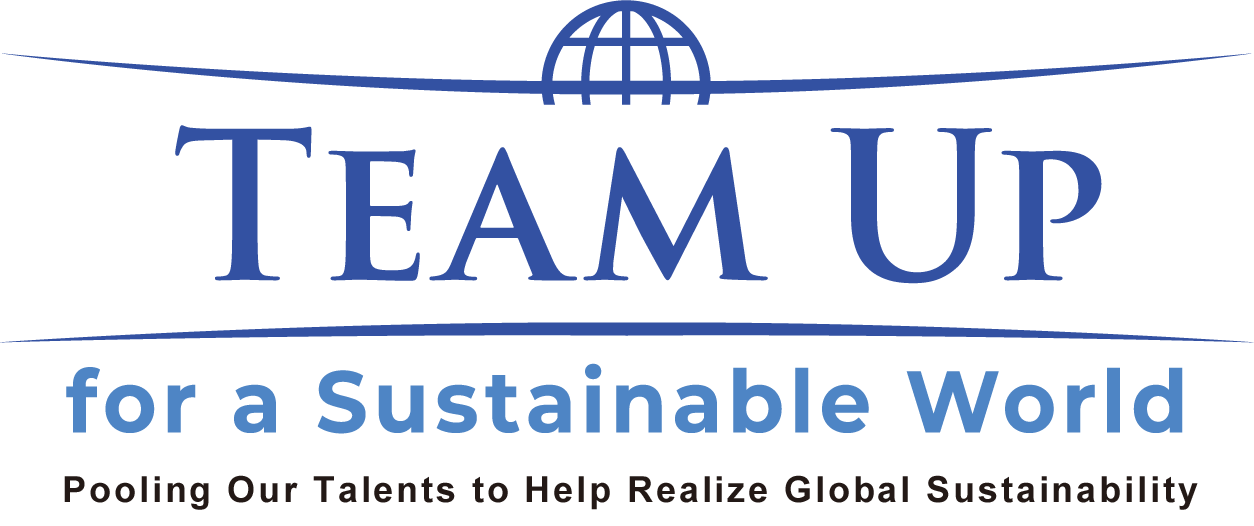TEAM UP for a Sustainable World:Frontline Perspectives on Decarbonization
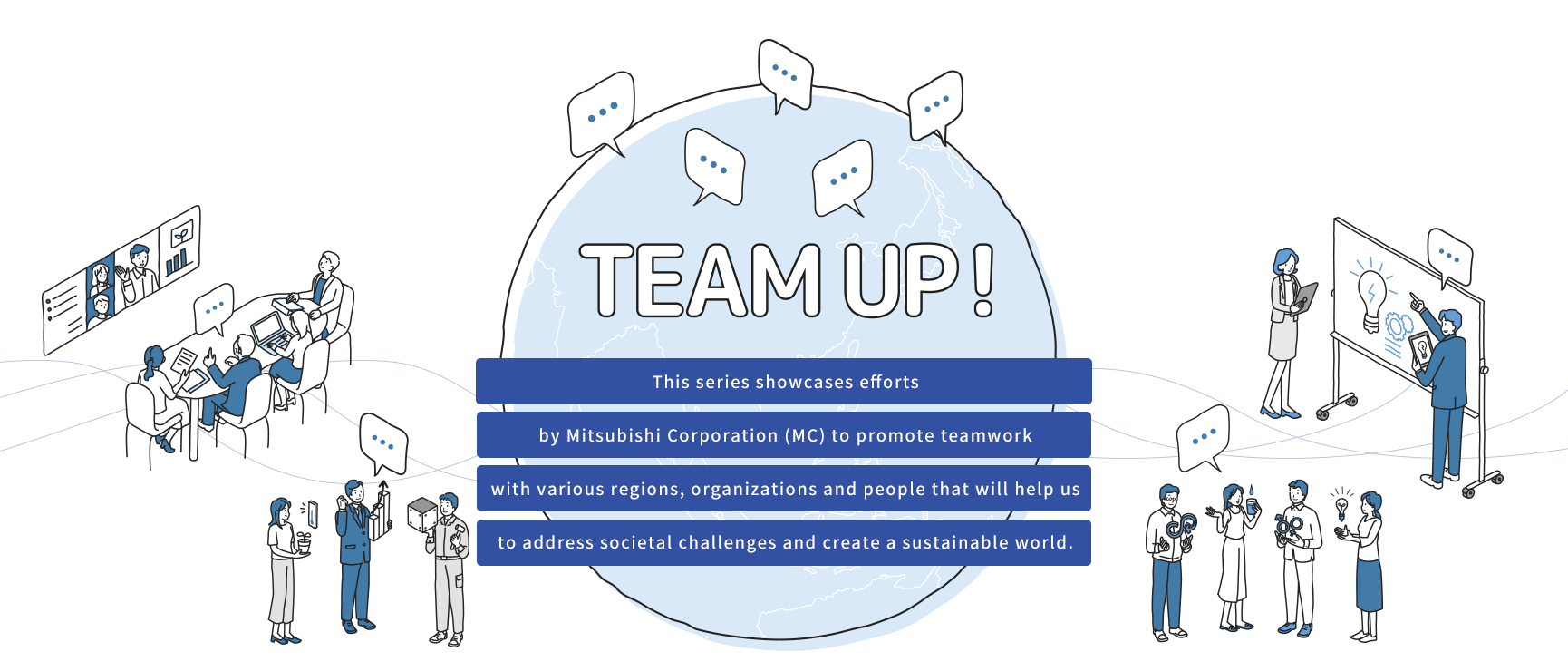
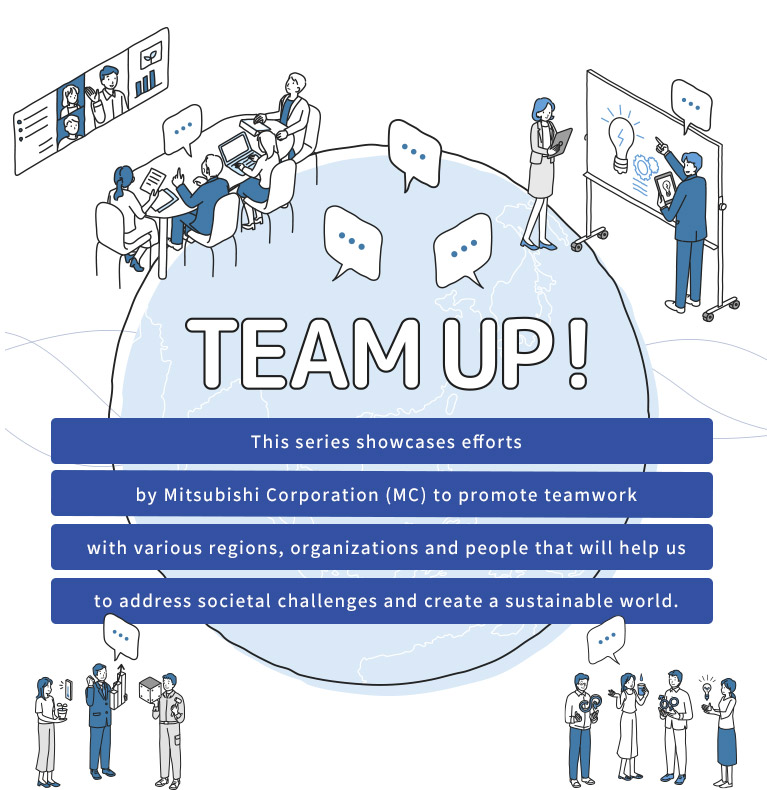
Frontline Perspectives on Decarbonization TEAM UP for a Sustainable World
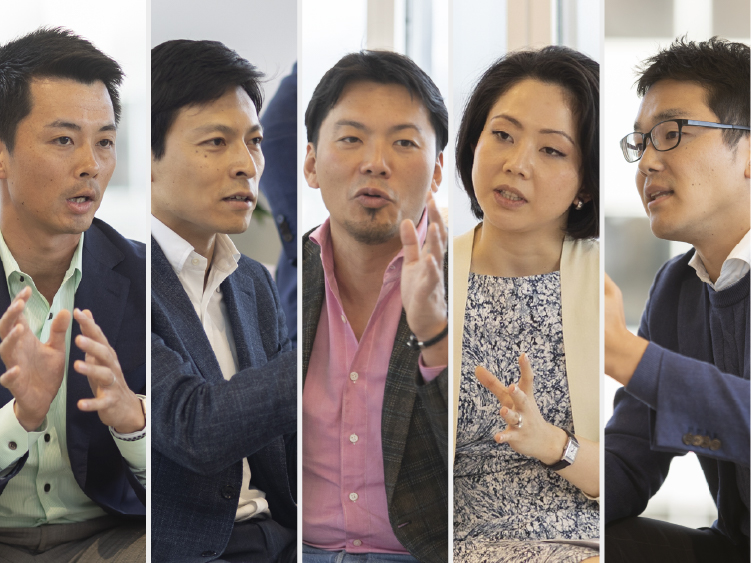
Breakthrough Energy Catalyst (BEC) (2)
The Breakthrough Energy Catalyst (BEC) platform was launched by Microsoft founder and global philanthropist Bill Gates in 2015. Its goal is to accelerate societal adaptations of net-zero energy technologies. This installment of Globe+ features part one of a roundtable discussion with five members of MC's BEC project team in the US. What insight can the team provide with respect to the thought processes, sentiments and businesses in American cities? Globe+ Editor in Chief Takashi Horiuchi caught up with the team in Houston via a video feed from Tokyo. Part two of the roundtable discussion will appear in our next installment.
- Roundtable Participants (MC Business Groups and BEC teams/fields of work) in parentheses)
-
Ryosuke Okumura (Natural Gas Group, BEC Project Team)
Shogo Yahagi (Petroleum & Chemicals Solution Group, BEC SAF Project Team)
Noriaki Takano (Power Solution Group, BEC LDES & Clean Hydrogen Project Team)
Masaki Harada (Natural Gas Group, BEC DAC Project Team)
Sherry Kitajima (Corporate, EX Research) - Interviewer
- MC's employees were interviewed by GLOBE+ Editor in Chief Takashi Horiuchi
Team Members from Four US Cities
—— First of all, I'd like to thank you all for coming together for this interview. It's great to have so many of MC's US-based BEC project team in the same place to answer my questions.
Okumura I'm in charge of coordinating our team from here in Houston, which as you know is in southern Texas. The control tower for MC's BEC project is in Tokyo, but we have arms in the US capital Washington D.C., Seattle on the west coast, and even in Europe. For today's interview, we've invited members from four US cities, so I'll let them introduce themselves.

Yahagi I'm also based here in Houston, and I work for the biomass-derived, sustainable aviation fuel (SAF) project team. Houston is often called the world's energy capital, and indeed, it is home to many of the world's leading energy companies, including western oil majors. Because this city has been so dependent on the oil-and-gas industry, there have been mixed reactions here to the decarbonization trend of recent years. Looking forward though, I think that there are companies in Houston that have the technologies and capabilities to overcome any differences of opinion.
Takano I work for MC's subsidiary Diamond Generating Corporation, which is engaged in power projects. Our office is in Boston, Massachusetts, on the US East Coast. As you all know, Boston is home to the Massachusetts Institute of Technology, which is one of the leading developers of cutting-edge energy systems. The city may be compact, but because it so effectively combines industry and academia through all of its startups, universities, research centers and other places of learning, it is a very stimulating place to work.
Harada I work on the West Coast, in Silicon Valley, California. My job is to identify businesses specializing in decarbonization. Most people think of Silicon Valley as being at the forefront of digital transformations, but the region is also an epicenter for innovation in energy transformations. Obviously there are a lot of startups there, but there are also many universities and research institutions which support the building blocks of technology, and venture capitalists as well. Furthermore, both the people and government of California are keenly aware of the need for sustainability. MC's business groups have dispatched employees to the company's Silicon Valley Branch, where their role is to take charge of innovation. They are hard at work every day, trying to create new value that transcends the borders between their respective groups.
Kitajima I work in New York, in the Corporate Staff section of Mitsubishi Corporation Americas (MCA). This is my ninth year in the city, and I've come to realize that despite its reputation for being the center of global finance and home to many of the world's Fortune 500 companies, it is also a hub for goods, labor and information. The United Nations headquarters is located in New York, and it's where many international frameworks and rules are established, including those on decarbonization. It's a good place to catch up with those on the forefront of new discussions.
Clarifying Targets with Data
—— Can I ask each of you to provide some details on the work you are doing, with respect to MC's involvement in BEC?
Harada New net-zero energy technologies are costly, so they aren't being widely used yet, but until they are, their costs aren't going to come down. The essence of our mission is to help solve that "chicken-and-egg" problem. What we're actually doing right now is assessing projects that plan on incorporating new technologies. There is a huge number of those that have applied for BEC support, most originating in the West. To determine which ones BEC should move forward with, we have to look at a lot of data, including recent tech trends, government regulations and support, product value chains, consumer connectivity, and so on. Once we've done that, we hold a series of meetings with the other BEC partners and make our decisions. The experience we gain through this process can then help MC to conceive new businesses.
—— Decarbonization is a common goal, but all of the players involved must have different opinions on the best ways to achieve it. How do you manage to deal with that?
Harada Yes, that's true, and it's at times like that when we have to remember BEC's philosophy, as espoused by Bill Gates. Everything we do must be based on science and data. The BEC program funds projects through investments, donations, green-product offtake purchase agreements, and so forth, but it also has an obligation to assess and quantify the future impacts of those things. This means scientifically analyzing the data to determine how much BEC's involvement in a project will reduce greenhouse gas emissions, lower the production costs of the associated technologies, and so on. This practice of "visualizing" projects can help us to decide what type of funding will maximize the impact of each of them. Furthermore, by ensuring that these kinds of impact assessments are standardized and globally recognized, we can attract new investments that align public and private interests. This is the type of virtuous cycle we're aiming for. It's an ambitious approach that has never been tried before, and I have to admit that even I was skeptical at first, but we've been speaking with many stakeholders, and those discussions have reminded me of its significance and possibilities.
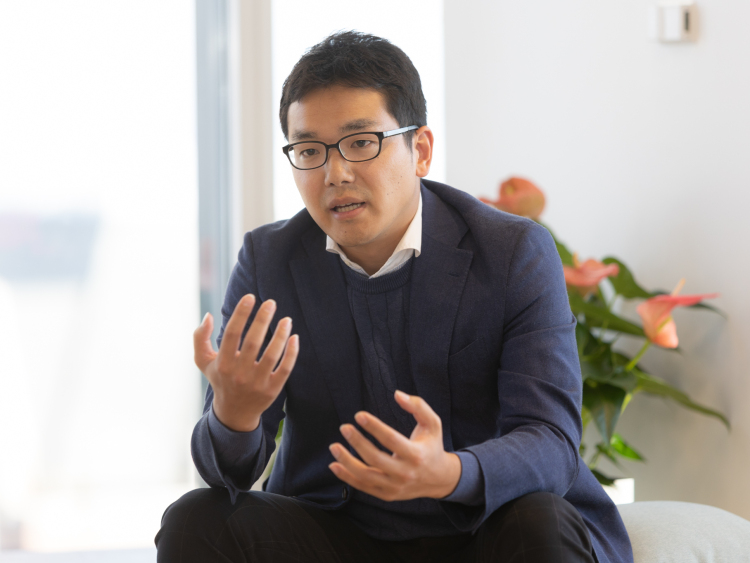
Developing New Tech and Providing a Bridge to Asia
─Sustainable Aviation Fuel (SAF)─
—— What's going on now with SAFs? I understand that they are being considered the key to decarbonizing the aviation industry.
Yahagi SAFs are made from biomass, used cooking oils, green hydrogen and other renewable energy sources. When they're mixed with conventional jet fuel, they can dramatically reduce CO2 emissions. It's difficult to power aircraft with electricity or hydrogen, so switching to SAFs is expected to have a big impact on achieving carbon neutrality in the aviation industry. Of BEC's four targeted technologies, SAFs are currently the most broadly used in society, but they still comprise less than 1% of the world's jet fuel. We have to develop mass-production systems if we hope to see countries make a genuine commitment to them.
—— That will necessitate a huge amount of raw materials, which must pose challenges in terms of procurement, cost reductions, and so on. How are you addressing those issues?
Yahagi Sourcing large quantities of biomass and installing the new technologies needed to produce SAFs are certainly challenges. Broadly speaking, there are four production methods, but this is a complex sector that involves a lot of different technologies and raw materials, including vegetable oils, ethanol, hydrogen, CO2 recycling systems, and so on. It actually spans operations handled by four of MC's business groups, namely the Food Industry Group, the Petroleum & Chemicals Solution Group, the Power Solution Group, and the Natural Gas Group. Together, we're working with partners all over the world to develop a new model for SAF technologies. We're also collaborating with the oil industry to introduce domestically produced SAFs, and we hope to act as a bridge to future mass production and societal adaptations in Asia.

Leveraging Frontline Know-How and Promoting Societal Adaptations
─Clean Hydrogen and Long-duration Energy Storage (LDS)─
—— BEC is also focusing on green hydrogen and LDS. Can you tell us a bit about those sectors?
Takano I'm part of the clean hydrogen and LDS project team. As you know, renewables like solar and wind only provide intermittent power due to their dependency on climatic conditions. So if we hope to make renewables our primary sources of power, then we have to store that power as either electrical or some other form of energy that can be converted back into electricity when needed. This is what LDS technologies do, and they need to be scaled up. Clean hydrogen refers to hydrogen derived from renewables or other sources in ways that emit relatively little CO2. In the future, we can expect to see more and more energy applications for it. Both LDS and clean-hydrogen technologies are essential to decarbonizing our societies, and here in the States, the US Department of Energy is taking a serious interest in them. MC is also taking steps to add value to its energy portfolio through renewables, as evidenced by its co-purchase of the comprehensive energy developer Eneco in 2020. Eneco is a Dutch company that is focused on "sustainable and smart energy solutions."
—— Due to economic structures and legal systems differing from one country or region to the next, I'm guessing that progress in decarbonization is rarely as straightforward as it sounds.
Takano You're right. Just in terms of hydrogen and LDS systems, there are differences between Europe and the US, each US state, and even the jurisdictions of each power company. Success in decarbonization demands as much of an understanding of each region's circumstances as it does an understanding of technologies and ideas. Since joining MC, I've gained practical, on-the-ground experience in a variety of settings, and I've learned just how important certain things are to sustainable businesses. They include communicating closely with residents and building relationships in the regions where your projects are focused, creating jobs, gaining approvals, building your infrastructure, and, when your businesses ultimately get underway, maintaining dialogues with the local interests. If you can't do those things, then your businesses will be of no benefit, no matter how advanced their technologies may be. I know how much BEC will be depending on MC for its frontline execution capabilities and diverse industry know-how, so I'm determined to contribute in every way I can.

Broad Connectivity a Strength in Burgeoning New Markets
─Direct Air Capture (DAC)─
—— DAC systems have been referred to as the secret to realizing a net-zero world. Please tell me a little bit about those systems.
Harada To achieve our net-zero-by-2050 targets, we will obviously need things like SAFs, clean hydrogen and LDS, but both the International Energy Agency and Intergovernmental Panel on Climate Change have stated that those technologies alone will not be enough. True carbon neutrality means absorbing more greenhouse gas emissions than we emit, across the board. Direct air capture technologies are a promising way of doing this, because they capture CO2 from the atmosphere and store it in deep underground geological formations. I'm part of BEC's DAC project team. Although these systems will play a big role in achieving net zero, they are currently difficult to make money from. Cap-and-trade schemes for carbon credits have gained momentum in recent years, but using DAC and other technologies to absorb CO2 is costly compared to natural methods like tree planting. Those developing and using the technologies need to be able to earn enough credits to offset the high costs.
—— I guess the key to emissions trading is the presence of those who are willing to buy the credits.
Harada Absolutely. Even in carbon markets, tech-based carbon sequestration is still a fledgling field, but MC has been a pioneer there in building networks with potential buyers and other stakeholders. Obviously MC has connections in the energy industry, but it has connections in many other industries as well, including with retailers like convenience stores, and automotive and mobility businesses too. We're in constant talks with players on the front lines of those industries, asking them what conditions would need to be met for them to purchase credits, what contractual innovations they need, why they need technology-based credits, and so on. The information that we have gleaned from those talks could be quite beneficial to getting societies to adopt DAC systems. Another point of note is that these systems actually use CO2 effectively. Methanation is the process of creating methane (a primary component of natural gas and city gas) from CO2 and molecular hydrogen. BEC's project team has proposed a scheme that uses methanation technologies with existing pipelines and other city-gas infrastructure to decarbonize the gas. Proposals like this focus on the unique characteristics of Japanese and other Asian societies, and in my opinion, MC's participation is the very reason that they are possible.
A Change in Mindset
—— What have you learned from your involvement in BEC?
Okumura Bill Gates founded Breakthrough Energy to get professionals from many different backgrounds and fields to share his "net-zero" mission, a network that includes philanthropists, scientists, entrepreneurs and the venture capitalists who are backing their work. BEC is in charge of investments in projects that seek to introduce new technologies and negotiations with government authorities, and my involvement with it is a constant reminder of just how driven it is to achieve its mission. I've worked in energy for a long time, so I'm well aware of how important it is for us to realize net zero, but honestly speaking, there used to be times when I'd question whether it's possible for Japan, which has never been blessed with an abundance of energy resources. When I joined BEC though, I stopped doubting the mission, and instead started focusing on what needs to be done to achieve it, and I made it my motto to look for solutions wherever there are problems. This was a fresh perspective for me, and it's perhaps the thing about Breakthrough Energy that has most influenced me. I imagine that BEC partners who aren't from MC feel much the same way.
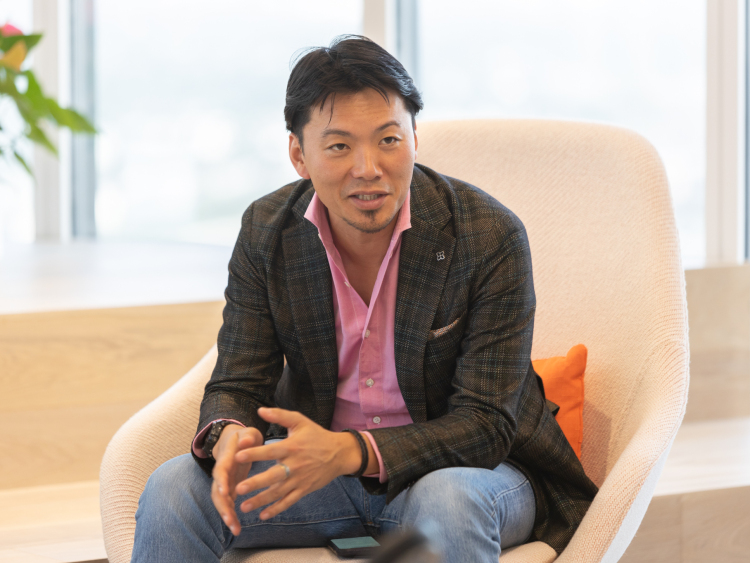
Kitajima I agree with Mr. Okumura's comments about being mission driven. I'd also add that the people involved with BEC are extremely passionate about what they're doing. This is a collective of specialists from many different industries, and when everyone is working together to achieve the same mission, the results will often be much better than expected.
Takano It's certainly a dedicated organization. The concerns and barriers faced by BEC are similar to those facing us at MC, but because everyone is so motivated to achieve their mission, they are always ready to confide in one another when they have problems and work diligently to solve them. Having witnessed this, I'm sure that societies around the world will acheive their net-zero ambitions, and when they do, BEC's partner companies will be leading the way. They are pushed by a constant sense of urgency, a feeling that the solutions may never be found unless we make it our own business to find them.
- * Volume 3 of this series will feature the second half of the roundtable discussion, focusing on BEC's future initiatives and its outlook for a carbon-free world.
- Breakthrough Energy Catalyst (BEC) (1)
- Breakthrough Energy Catalyst (BEC) (2)
- Breakthrough Energy Catalyst (BEC) (3)
